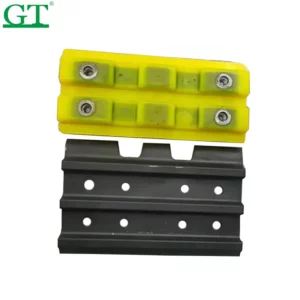How do Track Shoes contribute to the operation of manufacturing machinery?
Track shoes are critical components of tracked manufacturing machinery, such as crawler excavators, bulldozers, and compact track loaders. They play a significant role in the operation of these machines by providing traction, stability, and support in various working environments.
Here’s how track shoes contribute to the operation of manufacturing machinery:
- Traction: Track shoes are designed with treads or cleats that grip the ground surface, providing traction and preventing slippage, especially in loose or uneven terrain. This traction allows manufacturing machinery to maintain stability and maneuverability while performing tasks such as excavation, grading, or material handling.
- Weight Distribution: Track shoes distribute the weight of the manufacturing machinery evenly over a larger surface area, reducing ground pressure and minimizing soil compaction. This is particularly important when operating on soft or delicate surfaces, ensuring minimal impact on the environment and surrounding infrastructure.
- Mobility: Track shoes enable manufacturing machinery to traverse challenging terrain, including mud, sand, gravel, and uneven surfaces, where wheeled vehicles may struggle to maintain traction or maneuverability. Their rugged construction and tread design allow machinery to navigate obstacles and rough terrain with ease, enhancing overall mobility and accessibility.
- Durability: Track shoes are constructed from durable materials such as steel or rubber compounds, capable of withstanding the rigors of heavy-duty applications and harsh operating conditions. Their robust construction ensures longevity and reliability, China Track Shoes reducing maintenance requirements and downtime for manufacturing machinery.
- Versatility: Manufacturing machinery equipped with track shoes offers versatility in operation, allowing for efficient performance in a wide range of applications and environments. Whether working in construction sites, mining operations, forestry, or agricultural fields, tracked machinery can adapt to diverse working conditions with minimal modifications.
- Precision Control: Track shoes provide stable footing and precise control over movement, allowing operators to perform intricate tasks with accuracy and efficiency. This level of control is essential for applications such as grading, excavation, and material placement, where precise movement and positioning are critical for achieving desired results.
- Adaptability: Track shoes can be customized or replaced to suit specific application requirements, terrain conditions, or environmental factors. Different tread patterns, shoe widths, and materials can be selected based on factors such as soil type, ground conditions, and operational preferences, ensuring optimal performance and productivity.
Overall, track shoes play a vital role in the operation of manufacturing machinery by providing traction, stability, mobility, and durability in diverse working environments. Their robust construction, versatility, and precision control make them indispensable components for achieving efficient and reliable performance in various industrial applications.

